Ferenc Puskás facts for kids
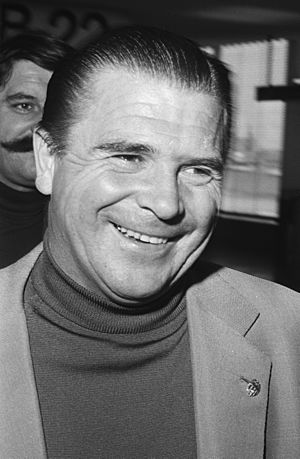
Puskás as Panathinaikos manager in 1971
|
|||||||||||||||||||||||||||||||
| Personal information | |||||||||||||||||||||||||||||||
|---|---|---|---|---|---|---|---|---|---|---|---|---|---|---|---|---|---|---|---|---|---|---|---|---|---|---|---|---|---|---|---|
| Birth name | Ferenc Purczeld | ||||||||||||||||||||||||||||||
| Date of birth | 1 April 1927 | ||||||||||||||||||||||||||||||
| Place of birth | Budapest, Hungary | ||||||||||||||||||||||||||||||
| Date of death | 17 November 2006 (aged 79) | ||||||||||||||||||||||||||||||
| Place of death | Budapest, Hungary | ||||||||||||||||||||||||||||||
| Height | 1.72 m (5 ft 8 in) | ||||||||||||||||||||||||||||||
| Position(s) | Forward, attacking midfielder | ||||||||||||||||||||||||||||||
| Youth career | |||||||||||||||||||||||||||||||
| 1940–1943 | Kispest Honvéd | ||||||||||||||||||||||||||||||
| Senior career* | |||||||||||||||||||||||||||||||
| Years | Team | Apps | (Gls) | ||||||||||||||||||||||||||||
| 1943–1956 | Budapest Honvéd | 350 | (358) | ||||||||||||||||||||||||||||
| 1958–1966 | Real Madrid | 180 | (156) | ||||||||||||||||||||||||||||
| Total | 530 | (514) | |||||||||||||||||||||||||||||
| International career | |||||||||||||||||||||||||||||||
| 1945–1956 | Hungary | 85 | (84) | ||||||||||||||||||||||||||||
| 1961–1962 | Spain | 4 | (0) | ||||||||||||||||||||||||||||
| 1963 | Madrid | 1 | (2) | ||||||||||||||||||||||||||||
| Managerial career | |||||||||||||||||||||||||||||||
| 1966–1967 | Hércules | ||||||||||||||||||||||||||||||
| 1967 | San Francisco Golden Gate Gales | ||||||||||||||||||||||||||||||
| 1968 | Vancouver Royals | ||||||||||||||||||||||||||||||
| 1968–1969 | Alavés | ||||||||||||||||||||||||||||||
| 1970–1974 | Panathinaikos | ||||||||||||||||||||||||||||||
| 1975 | Real Murcia | ||||||||||||||||||||||||||||||
| 1975–1976 | Colo-Colo | ||||||||||||||||||||||||||||||
| 1976–1977 | Saudi Arabia | ||||||||||||||||||||||||||||||
| 1978–1979 | AEK Athens | ||||||||||||||||||||||||||||||
| 1979–1982 | Al Masry | ||||||||||||||||||||||||||||||
| 1985–1986 | Sol de América | ||||||||||||||||||||||||||||||
| 1986–1989 | Cerro Porteño | ||||||||||||||||||||||||||||||
| 1989–1992 | South Melbourne Hellas | ||||||||||||||||||||||||||||||
| 1993 | Hungary | ||||||||||||||||||||||||||||||
|
Medal record
|
|||||||||||||||||||||||||||||||
| *Club domestic league appearances and goals | |||||||||||||||||||||||||||||||
Ferenc Puskás was a famous Hungarian football player and manager. He was born on April 1, 1927, and passed away on November 17, 2006. Many people think he was one of the greatest players ever. He was also known as the "Galloping Major."
Puskás was a forward, which means he played close to the opponent's goal to score. He scored an amazing 84 goals in 85 games for his home country, Hungary. He also played four games for Spain. He won an Olympic gold medal in 1952. He also helped Hungary reach the final of the 1954 FIFA World Cup.
He won many big titles, including three European Cups with Real Madrid. He also won ten national championships in Hungary and Spain. In 1995, he was named the best top-division scorer of the 20th century. He scored 806 goals in 793 official games, making him one of the top goal scorers of all time.
Puskás started his career in Hungary with Kispest and Budapest Honvéd. He was the top scorer in the Hungarian League four times. In the 1950s, he was the captain of the Hungarian national team, called the Mighty Magyars. After some political events in Hungary in 1956, he moved to Spain. There, he joined Real Madrid and continued to win many trophies.
After he stopped playing, Puskás became a coach. He led Panathinaikos to the European Cup final in 1971. In 1993, he briefly coached the Hungarian national team. In his honor, the main stadium in Budapest was renamed the Puskás Ferenc Stadion in 2002. FIFA also created the FIFA Puskás Award in 2009 for the "most beautiful goal" of the year.
Contents
Playing Career in Hungary
Early Football Days
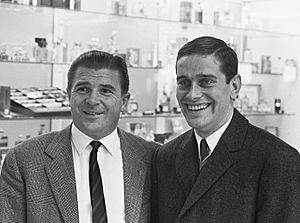
Ferenc Purczeld was born in Budapest on April 1, 1927. He grew up in Kispest, which is now part of Budapest. His mother, Margit Biró, was a seamstress. He began playing football as a junior for Kispest AC. His father, who had played for the club before, was a coach there.
In 1937, his father changed the family name to Puskás. Ferenc used a different name, "Miklós Kovács," to play before he was officially old enough. One of his first teammates was his childhood friend, József Bozsik. Puskás played his first senior game for Kispest in November 1943. This is when he got the nickname "Öcsi," meaning "Buddy."
In 1949, the Hungarian Ministry of Defence took over Kispest. The club became the army team and changed its name to Budapest Honvéd. Players were given military ranks. Puskás became a major, which led to his famous nickname, "The Galloping Major." Honvéd brought in the best Hungarian players, like Zoltán Czibor and Sándor Kocsis. During his time at Budapest Honvéd, Puskás helped the team win five Hungarian League titles. He was also the top goal scorer in the league several times. In 1948, he scored more goals than anyone else in Europe.
The Mighty Magyars
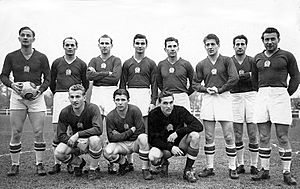
front row: Mihály Lantos, Ferenc Puskás, Gyula Grosics
back row: Gyula Lóránt, Jenő Buzánszky, Nándor Hidegkuti, Sándor Kocsis, József Zakariás, Zoltán Czibor, József Bozsik, László Budai
Puskás played his first game for Hungary on August 20, 1945. He scored in a 5–2 win against Austria. He played 85 games for Hungary and scored 84 goals. He scored three goals in one game (a hat-trick) against Austria twice. He also scored four goals in a 12–0 win over Albania.
Puskás, along with Zoltán Czibor, Sándor Kocsis, József Bozsik, and Nándor Hidegkuti, formed the core of the Golden Team. This team went unbeaten for 32 games in a row. During this time, they won the Olympic gold medal in 1952. They beat Yugoslavia 2–0 in the final in Helsinki. Puskás scored four goals in that tournament, including the first goal in the final.
The Golden Team famously beat England twice. First, they won 6–3 at Wembley Stadium. Then, they won 7–1 in Budapest. Puskás scored two goals in each of these games. In 1953, they also won the 1948-53 Central European International Cup. Puskás was the top scorer in this tournament with ten goals.
1954 FIFA World Cup
Puskás scored three goals in Hungary's first two matches at the 1954 FIFA World Cup. They beat South Korea 9–0 and then West Germany 8–3. In the game against West Germany, Puskás got a small ankle injury. This meant he couldn't play until the final match.
Puskás played in the 1954 World Cup final against West Germany even with his injured ankle. He scored his fourth goal of the tournament, putting Hungary ahead after six minutes. With another goal from Czibor, it looked like Hungary would win easily. However, West Germany scored two goals before half-time. With six minutes left, West Germany scored the winning goal. Puskás scored a late goal that was disallowed for offside. The Golden Team ended up with a silver medal.
Honvéd World Tour
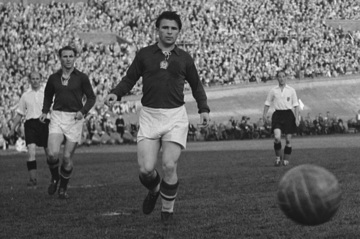
In 1956, Budapest Honvéd was playing in the European Cup. They were playing against Athletic Bilbao. Honvéd lost the first game. Before the second game, there were political troubles in Budapest. The players decided not to go back to Hungary.
They played the second game in Brussels, Belgium. Puskás scored, but Honvéd lost and was out of the tournament. The Hungarian players were unsure what to do. They brought their families from Budapest. Despite rules from FIFA, they went on a fundraising tour. They played games in Italy, Portugal, Spain, and Brazil. After the tour, some players returned to Hungary. Others, like Puskás, found new clubs in Western Europe. Puskás did not go back to Hungary until 1981.
Playing Career in Spain
In Spain, Puskás was also known as "Pancho."
Joining Real Madrid
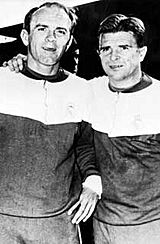
After leaving Hungary, Puskás played a few unofficial games. He was banned from playing in Europe for two years. After his ban ended, he tried to play in Italy, but clubs were worried about his age and weight. He was 31 years old. However, Real Madrid signed him. This started the second big part of his career.
In his first season with Real Madrid, Puskás scored four hat-tricks (three goals in one game). He scored three goals in his second game for the club. In one game, he and Alfredo Di Stéfano both scored hat-tricks in a 10–1 win. Puskás scored 156 goals in 180 league games for Real Madrid. He scored 20 or more goals in his first six seasons. He won the Pichichi Trophy (top scorer award) four times. He helped Real Madrid win La Liga five times in a row. He also helped them win the Copa del Generalísimo in 1962.
Puskás also scored 35 goals in 39 games in the European Cup. He helped Real Madrid reach the final in 1959, but he missed the game due to injury. In 1960, he scored four goals in the final as Real Madrid beat Eintracht Frankfurt 7–3. Di Stéfano scored the other three goals. Puskás scored another hat-trick in the 1962 final, but Real Madrid lost that game. He helped Real Madrid win the European Cup again in 1966, but he did not play in the final.
Playing for Spain
In 1962, Puskás became a Spanish citizen. He then played four games for Spain. Three of these games were at the 1962 World Cup. In Spain, people called him "Cañoncito Pum," which means "the booming cannon," because of his powerful shots.
Coaching Career
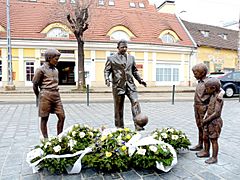
After he stopped playing, Puskás became a football coach. He managed teams in many different countries.
In 1971, he led Panathinaikos of Greece to the European Cup final. This was the only time a Greek club has reached a European final. Panathinaikos lost 2–0 to Ajax in the final. During his four years there, Puskás helped the team win one Greek Championship in 1972.
While Puskás was a great player, his coaching career was not as successful, except for his time at Panathinaikos. He did win the National Soccer League title in Australia with South Melbourne Hellas in 1991. He also won the NSL Cup in 1990 and two Dockerty Cup titles. One of his players in Australia was Ange Postecoglou, who later became a famous coach himself. Postecoglou said Puskás's attacking style influenced his own coaching.
Puskás returned to Hungary for the first time in 1981. In 1990, he made Budapest his home again. In 1993, he briefly coached the Hungarian national team for four games. One of these was a 4–2 friendly win against the Republic of Ireland. Hungary came back from being two goals down to win.
Playing Style
Puskás was known for his amazing ball control, especially with his left foot. He had a great first touch, which allowed him to make quick and accurate passes and crosses. He could also move around the field quickly, changing positions to confuse defenders. He was good at faking dribbles, pretending to go one way before moving another. He used this trick against England in their famous 6–3 game at Wembley.
Puskás was also excellent at set pieces, like free-kicks. He often scored powerful goals from far away, sometimes 30 to 35 meters from the goal. He even scored directly from a corner kick once! His left foot shot was one of the most powerful in football history.
Later Life and Passing
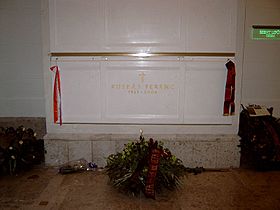
Puskás became ill in 2000. He was admitted to a hospital in Budapest in September 2006. He passed away on November 17, 2006, at 79 years old. He was survived by his wife, Erzsébet, and their daughter, Anikó.
He received a state funeral in Hungary. His coffin was moved from the Puskás Ferenc Stadion to Heroes' Square. He was buried under the dome of the St Stephen's Basilica in Budapest on December 9, 2006.
Legacy and Honors
Puskás's legacy lives on in many ways:
- The main stadium in Budapest was renamed the Puskás Ferenc Stadion in his honor in 2002.
- An asteroid, 82656 Puskás, was named after him in 2006.
- A street near Stadium Bozsik in Budapest was renamed after Puskás one year after he passed away.
- The new Puskás Aréna, its metro station, and the Puskás Akadémia FC football club are all named after him.
- The FIFA Puskás Award is given each year for the "most beautiful goal."
- A statue of Puskás was put up in 2017 in Melbourne, Australia.
Major Player Honors
Budapest Honvéd
- Nemzeti Bajnokság I (Hungarian League): 1949–50, 1950, 1952, 1954, 1955
Real Madrid
- La Liga (Spanish League): 1960–61, 1961–62, 1962–63, 1963–64, 1964–65
- Copa del Generalísimo (Spanish Cup): 1961–62
- European Cup: 1958–59, 1959–60, 1965–66
- Intercontinental Cup: 1960
Hungary National Team
- Summer Olympics Gold Medal: 1952
- Central European International Cup: 1948–53
- FIFA World Cup Runner-up: 1954
Individual Awards
- Ballon d'Or Silver Award: 1960
- Spanish League top scorer: 1959–60, 1960–61, 1962–63, 1963–64
- European Cup top scorer: 1959–60, 1963–64
- FIFA 100: Listed as one of the greatest living footballers by Pelé.
- UEFA Golden Player: Named the greatest Hungarian Footballer of the last 50 Years.
Images for kids
See also
 In Spanish: Ferenc Puskás para niños
In Spanish: Ferenc Puskás para niños
 | Tommie Smith |
 | Simone Manuel |
 | Shani Davis |
 | Simone Biles |
 | Alice Coachman |


